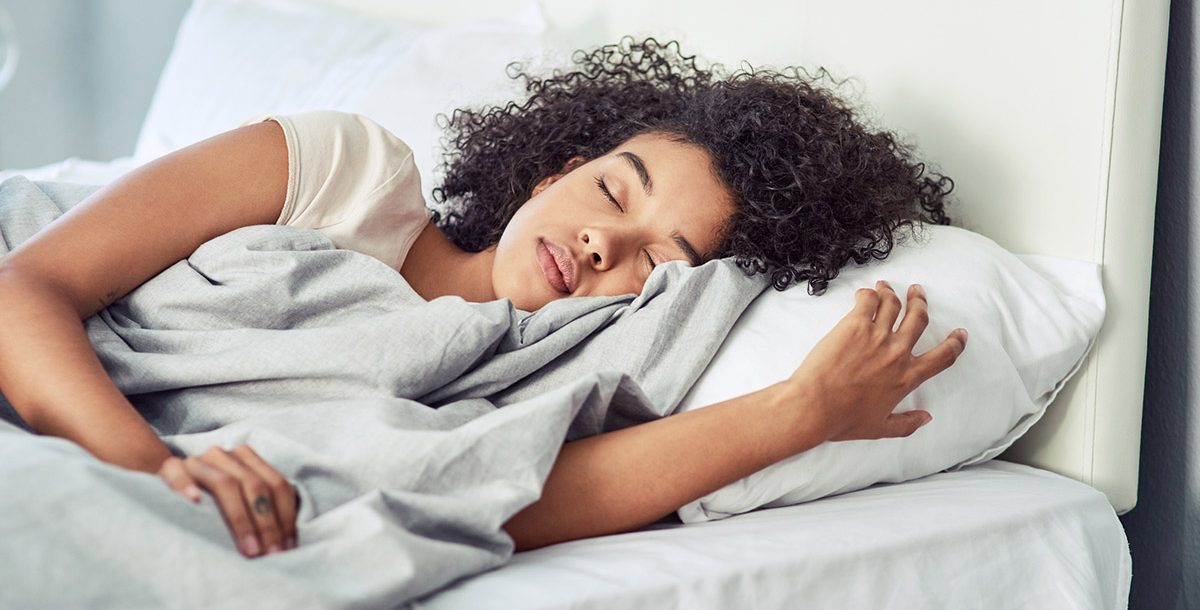Sleep is essential to your health, which means improving sleep habits is important.
When you get enough sleep, you tend to get sick less often, have lower stress levels and feel better during the day. You may also find it easier to maintain your weight, think clearer and lower your risk of health problems when your body is rested.
So, if you’re spending your nights tossing and turning, you may wonder how to get through the night and stay asleep. These tips on good sleep habits can help.
First, go to sleep at the same time each night.
Setting a regular sleep schedule by going to sleep at the same time each night is one of the best things you can do. Give yourself a bedtime and stick with it, even on the weekends. This helps support your body’s sleep-wake cycle, or circadian rhythm, so you’re able to wake up refreshed and fall asleep faster. Overall, it will help you sleep better at night naturally.
Many people try to catch up on sleep by sleeping in on the weekend, but your body’s internal clocks don’t know whether it’s Tuesday or Sunday. It aligns naturally with the sunrise and sunset. If you really enjoy spending some extra time in bed on your days off, allow yourself to nap for no more than an hour so you don’t cause ongoing sleep problems for yourself.
Second, watch what you eat and drink.
What you eat and drink before bed can affect your sleep. The discomfort you feel after eating a large meal or going to sleep hungry can keep you awake during the night. So, make sure you eat before bed but at the same time avoid eating large meals an hour before bed.
It’s also helpful to avoid alcohol and caffeinated beverages close to bedtime. Caffeine stimulates your nervous system, while alcohol can increase symptoms of sleep apnea and decrease melatonin.
Watching what you consume can help you sleep through the night without waking up. You can also experiment to find foods and drinks that help you sleep, like chamomile tea, tart cherry juice, kiwis and turkey.
Third, set up a sleep ritual.
When you were a kid, your parents may have given you a bedtime routine that included a bath and a story. Sleep rituals are good for adults, too. Try relaxation techniques like taking a shower or bath, reading a book or deep-breathing meditation. You may find yourself falling asleep faster and not having trouble sleeping when you prepare your body for bedtime.
It also helps to create an environment where you can sleep. Most people sleep best in a room that’s cool, dark and quiet. Blackout curtains can block outdoor light, and a sound machine may mask sounds that can disrupt your sleep. As for sleep hygiene, if you haven’t updated your bedding for a while, consider investing in a new mattress, pillow and sheets to maximize your comfort. Also, be sure to reserve your bed for sleep and not lots of other activities.
Fourth, limit electronics in the bedroom.
You may enjoy falling asleep to the sounds of your favorite late-night host or playing a game on a tablet to unwind, but you may be doing more harm than good. These electronic devices emit blue light that makes your body think it’s still daytime. If you have to use these devices, download a blue light-blocking app to your phone or tablet or wear blue light-blocking glasses.
Ideally, you should stop watching TV and turn off bright lights in your home about two hours before your bedtime. This sends a signal to your body that it’s time to start winding down and prepare for bed. It also gives you a chance to relax at the end of your day, which allows your heart rate, blood pressure and muscle tension to go down.
And fifth, move your body during the day.
Many people notice they sleep better at night when they’re active during the day. In fact, the extra benefits that come with exercise make it a better choice than sleep-enhancing drugs. Physical activity also can help you control your weight and reduce anxiety.
Even better, working out outdoors increases your exposure to sunlight, which also helps you sleep better. This is because natural light affects your body’s circadian rhythm, its internal clock that lets it know when it’s time to sleep and wake up. When your circadian rhythm is aligned with your habits, you shouldn’t experience disrupted sleep at night and have more energy during the day.
These five tips for improving sleep should help you find the good nights sleep you’ve been looking for. But if these tips don’t help you get more Z’s, it may be time to reach out to your primary care provider.
Learn more about the primary care services as well as the sleep medicine services we provide Bon Secours.





